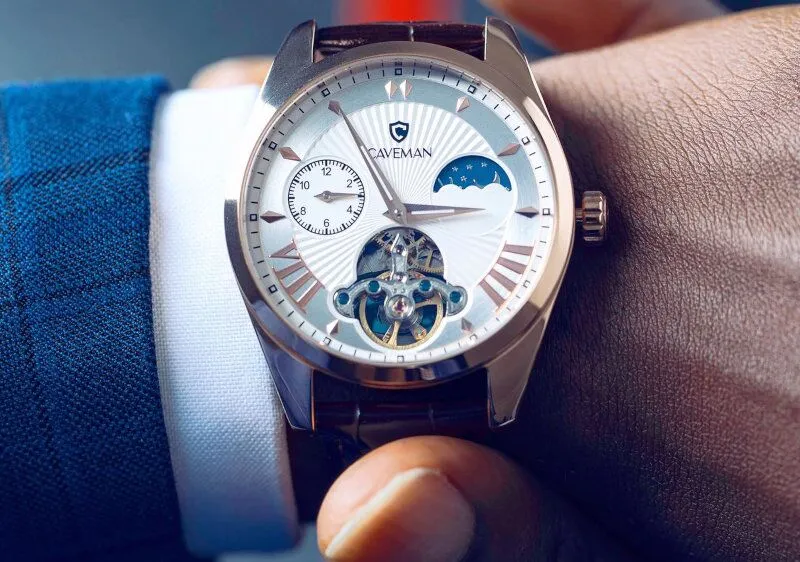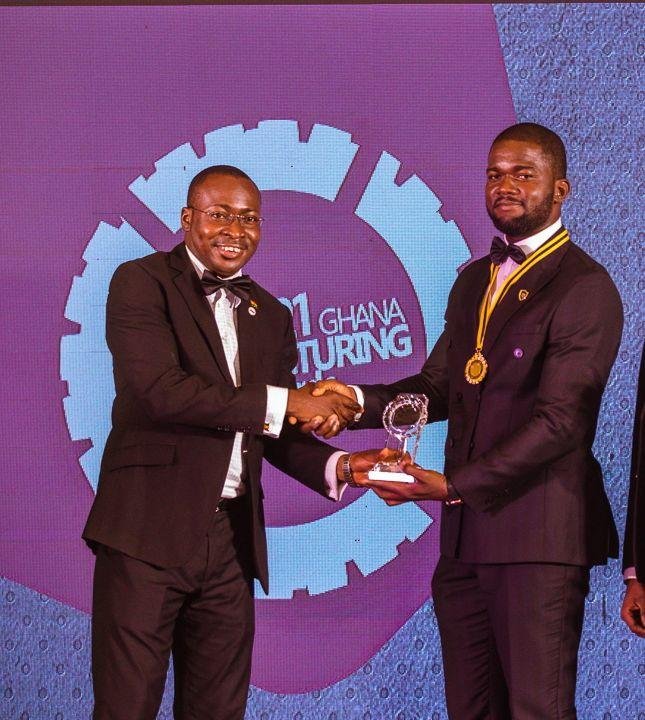Hot!
Anthony Dzamefe eyes global recognition with Caveman watches

Anthony Dzamefe
From venturing into a business accidentally, Anthony Dzamefe has created the first African watch brand, Caveman and is set to compete on the global market.

Dzamefe in the last five years has carved a niche with his brand to compete with the best in the space.
In 2018, from a small shop at Adjiringanor in Accra, he nurtured and researched about the dream for nearly three years after which the maiden brand of Blue Caveman watches hit the market.
Five years later, Ghanaians have become familiar with watches.

But how did it all start?
In 2015, young Dzamefe, without any knowledge about watches, resigned from a hotel job and ventured into business.
He sold suits and petty items to make a living; but that did not last. With frustration setting in, he walked into a shop to get a watch with just GHȻ50 in hand but the watch was priced at GHȻ150, to his surprise.

Dzamefe walked away and decided to search online where he found a watch which he bought at GHȻ50 and posted on social media. Surprisingly, it attracted a buyer.
That birthed the idea to go into selling watches on the streets and university campuses in Accra to make a living.
The ambitious Dzamefe wanted more so he added to his portfolio the art of repairing the watches, making leather straps, breaking watches apart and essentially reverse engineering in order to come out with something since there was no African watch brand on the market amidst millions of watches sold across the continent.

After satisfying his curiosity on watches and creating a unique idea to promote his brand, the first product, the iconic Blue Volta model of about 50 pieces were produced under the Caveman brand.
The first 50 pieces took about two to three months to sell and Dzamefe restocked to produce more.

Dzamefe managed to demystify the idea that watches from Africa were inferior by conducting a survey to understand people’s preference for watches in order to sell faster.
He was intentional about going the extra mile to guarantee quality to make a statement on the market because “no one should regret ever buying my brand of watches; my buyers must rather become ambassadors.”
The plan was to run the business in five-year batches. Following a great first season in Ghana, Dzamefe is stepping into phase two, predominantly entering the global space (Dubai, UK,USA, Nigeria and other African and European countries).
The global approach demanded a showroom of international standards hence the recent opening of the grand showroom at East Legon.
Now, Dzamefe considers the brand ready for the competition in the global space, following the great work done on his products.

The brand had a few complications in terms of designs and lately implemented native elements into its designs to poke the sentiments of Africans and beyond.
It was, however, not without challenges as his mother did not accept the fact that his brilliant son who studied science at the Senior High School and could also become a banker had devoted his time to making watches.

There were also financial challenges as well as the challenge of working with people.
Aside producing watches, Dzamefe can also draw, write poems, play basketball, golf and piano among others.
With his talent, he is able to design his own watches, create commercials, write scripts for adverts, take photos and write a book.
Dzamefe started basic school from Mawuli Primary and went to St. Paul’s in 2007, all in the Volta Region. In 2009, he went to the University of Professional Studies, Accra (UPSA) where he did Business Management and later studied Business Administration.
He recently finished a Stone Setting course in Switzerland to enhance his production.
He has won several Awards including Emy Awards, Brand of the Year, Future of Ghana Award, 30 Under 30 Awards, Entrepreneur of the Year, Company of the Year, Product of the Year and also got recognised by the Office of the President for excellence in innovation.
By Michael D. Abayateye
Hot!
Many SOEs have been used as mere instruments for personal wealth accumulation –Pres.Mahama

President John Dramani Mahama has expressed concern over the misuse of State-Owned Enterprises (SOEs) for personal financial gain by individuals in leadership positions.
Speaking during a meeting with Chief Executives of specified entities under the State Interest and Governance Authority (SIGA) on Thursday, March 13, the President directly attributed the dire state of SOEs to their leadership, accusing chief executives, management teams, and governing boards of prioritising personal enrichment over organisational efficiency.
He pointed to bloated budgets, unjustified allowances, and unnecessary expenditures as factors draining public funds while SOEs continue to rely on government bailouts.
“Many SOEs have been used as mere instruments for personal wealth accumulation by appointees. The chief executives, management, and boards of these enterprises are responsible for this situation. Some SOEs have become perennial loss-makers, draining public funds with bloated budgets, unjustified allowances, and unnecessary expenditures while relying on government bailouts as if entitled to them. Many of these entities are at their lowest point in the entire history of the Fourth Republic,” he said.
President Mahama further noted that many SOEs have been plagued by inefficiencies, corruption, and mismanagement, leading to consistent financial losses. He cited the 2023 State Ownership Report by the State Interests and Governance Authority (SIGA), which highlighted systemic inefficiencies and wasteful expenditures within these entities.
He therefore reaffirmed his commitment to reforming under-performing SOEs and ensuring they serve national interests.
He warned that loss-making SOEs will no longer be tolerated and will either be merged, privatised, or closed.
“I will assess you based on your performance. If you do not align with the pace of the reset agenda, you may be asked to step aside. If that adds to the horror movie, so be it,” he added.
Source: Myjoyonline.com
Hot!
Prophet Courage Heavens set to launch ‘Predestination’ book on March 23

Prophet Courage A. Heavens is set to launch the much-awaited book titled ‘Predestination’ on Sunday, March 23, 2025 at 5:00PM.
The launch, which is expected to impact lives, will take place at Crossgates Ministries, Flattop, off N1 Highway, opposite Angel Hauz.
The book is aimed at addressing the way people struggle to understand how free will and destiny align.
It is also aimed at providing clarity on God’s sovereignty and one’s place in His divine plan.
The various chapters of the book address various issues through scriptures and personal stories.
Committed to impacting society, part of the proceeds from the book will go into Courage Heavens Education Legacy (CHEL), an educational foundation transforming lives.

CHEL is dedicated to providing financial support and mentorship to brilliant but needy students, ensuring they have access to quality education and opportunities for a better future.
Prophet Courage Heavens is a prolific writer and previously authored Eli Eli Lama Sabachthani, a powerful book that encourages unwavering faith in times of trials.
In addition, he has written seven more prophetic and life-changing books that are yet to be published.
He is dedicated to raising the next generation for impactful ministry. As the leader of Crossgates Ministries, he nurtures believers in faith and purpose.







